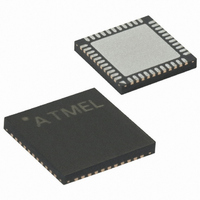ATMEGA32A-MNR Atmel, ATMEGA32A-MNR Datasheet - Page 202

ATMEGA32A-MNR
Manufacturer Part Number
ATMEGA32A-MNR
Description
IC MCU AVR 32K 16MHZ 44VQFN
Manufacturer
Atmel
Series
AVR® ATmegar
Datasheet
1.ATMEGA32A-MU.pdf
(353 pages)
Specifications of ATMEGA32A-MNR
Core Processor
AVR
Core Size
8-Bit
Speed
16MHz
Connectivity
I²C, SPI, UART/USART
Peripherals
Brown-out Detect/Reset, POR, PWM, WDT
Number Of I /o
32
Program Memory Size
32KB (16K x 16)
Program Memory Type
FLASH
Eeprom Size
1K x 8
Ram Size
2K x 8
Voltage - Supply (vcc/vdd)
2.7 V ~ 5.5 V
Data Converters
A/D 8x10b
Oscillator Type
Internal
Operating Temperature
-40°C ~ 85°C
Package / Case
44-VFQFN Exposed Pad
Lead Free Status / RoHS Status
Lead free / RoHS Compliant
Available stocks
Company
Part Number
Manufacturer
Quantity
Price
- Current page: 202 of 353
- Download datasheet (6Mb)
20.9
20.9.1
8155C–AVR–02/11
Register Description
TWBR – TWI Bit Rate Register
Several different scenarios may arise during arbitration, as described below:
This is summarized in
Figure 20-21. Possible Status Codes Caused by Arbitration
• Bits 7:0 – TWI Bit Rate Register
TWBR selects the division factor for the bit rate generator. The bit rate generator is a frequency
divider which generates the SCL clock frequency in the Master modes. See
Unit” on page 182
Bit
Read/Write
Initial Value
• Two or more masters are performing identical communication with the same slave. In this
• Two or more masters are accessing the same slave with different data or direction bit. In this
• Two or more masters are accessing different slaves. In this case, arbitration will occur in the
case, neither the slave nor any of the masters will know about the bus contention.
case, arbitration will occur, either in the READ/WRITE bit or in the data bits. The masters
trying to output a one on SDA while another master outputs a zero will lose the arbitration.
Losing masters will switch to not addressed slave mode or wait until the bus is free and
transmit a new START condition, depending on application software action.
SLA bits. Masters trying to output a one on SDA while another master outputs a zero will lose
the arbitration. Masters losing arbitration in SLA will switch to slave mode to check if they are
being addressed by the winning master. If addressed, they will switch to SR or ST mode,
depending on the value of the READ/WRITE bit. If they are not being addressed, they will
switch to not addressed slave mode or wait until the bus is free and transmit a new START
condition, depending on application software action.
START
TWBR7
R/W
7
0
for calculating bit rates.
Address / General Call
Figure
Direction
received
TWBR6
Own
R/W
Yes
6
0
Arbitration lost in SLA
SLA
20-21. Possible status values are given in circles.
Write
Read
TWBR5
R/W
No
5
0
TWBR4
R/W
4
0
68/78
38
B0
Arbitration lost in Data
TWBR3
R/W
3
0
TWI bus will be released and not addressed slave mode will be entered
A START condition will be transmitted when the bus becomes free
Data byte will be received and NOT ACK will be returned
Data byte will be received and ACK will be returned
Last data byte will be transmitted and NOT ACK should be received
Data byte will be transmitted and ACK should be received
TWBR2
R/W
2
0
Data
TWBR1
R/W
1
0
ATmega32A
“Bit Rate Generator
TWBR0
R/W
0
0
STOP
TWBR
202
Related parts for ATMEGA32A-MNR
Image
Part Number
Description
Manufacturer
Datasheet
Request
R

Part Number:
Description:
Manufacturer:
Atmel Corporation
Datasheet:

Part Number:
Description:
Manufacturer:
ATMEL Corporation
Datasheet:

Part Number:
Description:
IC AVR MCU 32K 16MHZ 5V 44-QFN
Manufacturer:
Atmel
Datasheet:

Part Number:
Description:
IC AVR MCU 32K 16MHZ 5V 40DIP
Manufacturer:
Atmel
Datasheet:

Part Number:
Description:
IC AVR MCU 32K 16MHZ 5V 44TQFP
Manufacturer:
Atmel
Datasheet:

Part Number:
Description:
IC AVR MCU 32K 16MHZ IND 40-DIP
Manufacturer:
Atmel
Datasheet:

Part Number:
Description:
IC AVR MCU 32K 16MHZ IND 44-TQFP
Manufacturer:
Atmel
Datasheet:

Part Number:
Description:
MCU AVR 32KB FLASH 16MHZ 44TQFP
Manufacturer:
Atmel
Datasheet:

Part Number:
Description:
MCU AVR 32KB FLASH 16MHZ 44QFN
Manufacturer:
Atmel
Datasheet:

Part Number:
Description:
MCU AVR 32K FLASH 16MHZ 44-TQFP
Manufacturer:
Atmel
Datasheet:

Part Number:
Description:
IC AVR MCU 32K 16MHZ COM 40-DIP
Manufacturer:
Atmel
Datasheet:

Part Number:
Description:
IC AVR MCU 32K 16MHZ COM 44-QFN
Manufacturer:
Atmel
Datasheet:

Part Number:
Description:
IC AVR MCU 32K 16MHZ COM 44-TQFP
Manufacturer:
Atmel
Datasheet:











